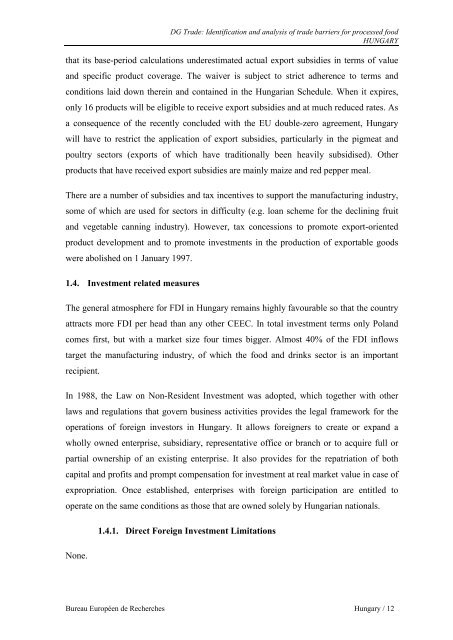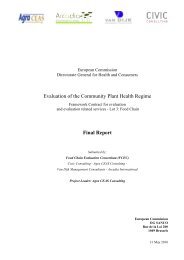HUNGARY Report.pdf - Agra CEAS Consulting
HUNGARY Report.pdf - Agra CEAS Consulting
HUNGARY Report.pdf - Agra CEAS Consulting
- No tags were found...
Create successful ePaper yourself
Turn your PDF publications into a flip-book with our unique Google optimized e-Paper software.
DG Trade: Identification and analysis of trade barriers for processed food<strong>HUNGARY</strong>that its base-period calculations underestimated actual export subsidies in terms of valueand specific product coverage. The waiver is subject to strict adherence to terms andconditions laid down therein and contained in the Hungarian Schedule. When it expires,only 16 products will be eligible to receive export subsidies and at much reduced rates. Asa consequence of the recently concluded with the EU double-zero agreement, Hungarywill have to restrict the application of export subsidies, particularly in the pigmeat andpoultry sectors (exports of which have traditionally been heavily subsidised). Otherproducts that have received export subsidies are mainly maize and red pepper meal.There are a number of subsidies and tax incentives to support the manufacturing industry,some of which are used for sectors in difficulty (e.g. loan scheme for the declining fruitand vegetable canning industry). However, tax concessions to promote export-orientedproduct development and to promote investments in the production of exportable goodswere abolished on 1 January 1997.1.4. Investment related measuresThe general atmosphere for FDI in Hungary remains highly favourable so that the countryattracts more FDI per head than any other CEEC. In total investment terms only Polandcomes first, but with a market size four times bigger. Almost 40% of the FDI inflowstarget the manufacturing industry, of which the food and drinks sector is an importantrecipient.In 1988, the Law on Non-Resident Investment was adopted, which together with otherlaws and regulations that govern business activities provides the legal framework for theoperations of foreign investors in Hungary. It allows foreigners to create or expand awholly owned enterprise, subsidiary, representative office or branch or to acquire full orpartial ownership of an existing enterprise. It also provides for the repatriation of bothcapital and profits and prompt compensation for investment at real market value in case ofexpropriation. Once established, enterprises with foreign participation are entitled tooperate on the same conditions as those that are owned solely by Hungarian nationals.None.1.4.1. Direct Foreign Investment LimitationsBureau Européen de Recherches Hungary / 12













